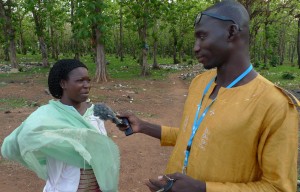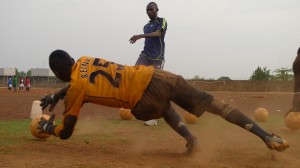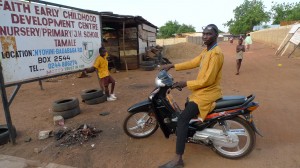Journalists@Work: Abubakari Yussif
In the next of our Journalists@Work series, we meet Abubakari Yussif. He’s a reporter with Radio Justice in Tamale, a bustling trading town in the Northern Region, one of Ghana’s poorest areas. Yussif has been working as a journalist for the past four years at Radio Justice where he reports for the news and current affairs department. As an avid sports fan, he also writes the sports news and occasionally presents a sports program. He works in Dagbani, the main language spoken in northern Ghana, and also reads the news in Gonja, his local language. He also speaks English, Twi and Hausa.
DW Akademie’s Kate Hairsine spoke to Yussif about his work and how proud he is to have come so far despite his poor background.
Why did you decide to become a journalist?
I am very curious. I always want to know what is going on, what is happening. Also when I was in secondary school, there were a lot of journalists here in Ghana who I found inspiring – such as Kojo Opong Nkrumah, Shamima Muslim and Kwabina Yaboah. Every time I heard their voices, I thought of becoming a journalist. At the end of high school, unfortunately, I couldn’t study further because I am from a very poor family so I couldn’t afford to spend three years studying. But I went to Radio Justice and started following journalists around who worked there. I did this for about two years. During my attachment, I was able to impress them that I was capable and then they offered me a reporting position.
What do you like most about being a journalist?
What I like most is that when something happens, a lot of people try to get in touch with you to see what is happening, to see if what the people are saying is true. So sometimes I am at an event and people are calling me – even people I don’t know.
This always prompts me to try to be proactive and try to find out things that I don’t know so that I can be telling these people the correct information. It makes me properly research what is happening.
What do you hate most about being a journalist?
What I hate in this particular job is journalists who are subjective. I always want to be objective. There are journalists who take sides and don’t hear both sides of the stories before deciding how to do their stories. As well, sometimes you air a particular story and people are running after you because they don’t like what you have said and meanwhile you are saying the truth. So actually, there are so many challenges. But I still think this is the best job for me.
What’s the most interesting story that you worked on so far?
There have been so many, but the one I would like to mention has to do with a celebrity. She is a singer. Her brother gave his young son to her to be taken care of by her. This celebrity, she maltreats the boy, she beats him so much that he even has sores on his back. Someone told me about this and I did more investigation and I published this story. And the authorities subsequently arrested her. And I was so happy about this particular story simply because I was not able to see this little boy being maltreated by his aunt. Especially as celebrities should be acting as role models.
What is the most difficult story you have covered?
I once attended a meeting organized by an NGO involved in women’s empowerment. Speaking at the meeting was a girl who was about 22 years old. She talked about the issue of not being able to go to school because she had no one to pay her fees and other things. Fortunately she met someone from the NGO who then supported her. I shed tears. It touched me. I thought she was my twin sister because the circumstances that she was talking about were the same circumstances that I come from. When she was speaking, it reminded me of my own story. For example, I didn’t attend primary school. I was about seventeen when I started attending school. I could only do this because I was so good at sport. I played football, handball, volleyball, hockey and athletics so the school allowed me to attend without fees. And it was very difficult for me. When I first started, I couldn’t even understand the master because I couldn’t understand English. So when this young girl was sharing her story, I felt like it was me because that was this same issues I had. And when I was writing the story I was shedding tears because I thought I was the only person who went through that.
How do you feel you are progressing as a journalist?
I think that it is undeniable that I want to be correct and you can only be correct when you accept criticism. So I always want people to criticize me. I am always ready and waiting for criticism so I will be able to improve. When I got into this job, it was initially very difficult for me to produce a story. And there were a lot of people in my office and they were good so I attached myself to them. And now, my editor is very proud of me. She now sends me to cover events where it will be very difficult to get the story because she knows I am able to produce a story for her. Sometimes when she sits down to edit, she will go through the story and she will not edit anything. And sometimes I feel proud of what I am and whom I am now. Because I started from scratch and I am getting somewhere. And I say, “Wow, is that me that put out this story?” and I become very happy.
What kind of equipment do have?
I had a small digital voice recorder that I bought myself. I don’t have a laptop or a computer or anything like this. I would still like to get more equipment but I have to save for it.
You bought a motorbike four months ago. Could you work as a journalist without a bike?
I worked for three years and eight months without a bike so that shows it is possible. But I would always have to wait to get a taxi and have to walk. With this bike I get to place on time and it is very easy to get around now to do my reporting.
What kind of media you consume?
I watch the TV because of the visuals – you can listen and see as well so you learn a lot. I like that you can see the reporter reporting from a place. I also listen to the radio so that I can boost my knowledge. I especially listen to programs that I don’t do so I can learn more and develop my skills. A lot of people get their stories from Facebook but people can just post anything on Facebook so I don’t use it for stories. I think if you are a fan of news from Facebook, you might be found wanting in the future because then you will broadcast something that isn’t true. I don’t have Internet at home but we have Internet at work. I use it sometimes to find stories.
What would your dream be as a journalist?
My dream job is to be an international journalist reporting for BBC, for DW, for CNN or Al Jazeera, one of these big names.







Feedback